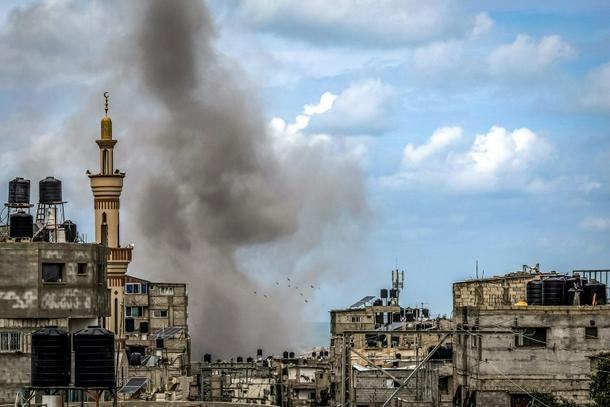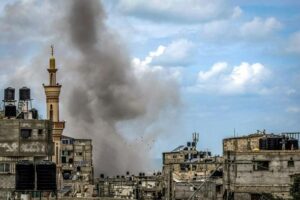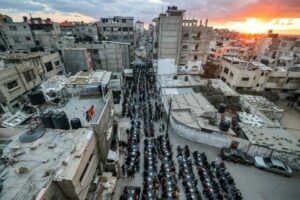
United Nations (United States) (AFP) – The UN Security Council is scheduled to convene on Monday to deliberate on a new resolution proposing an “immediate” ceasefire in Gaza, subsequent to the veto of an earlier draft by the United States from Russia and China.
The Security Council has encountered divisions regarding the Israel-Hamas conflict since the onslaught beginning on October 7, greenlighting only two out of eight resolutions, primarily focusing on humanitarian assistance for the besieged Gaza Strip.
Amidst being a staunch supporter of Israel, the US – a permanent Council member – has staunchly backed Israel’s right to self-defense in the face of unprecedented attacks by Hamas. Nonetheless, given the escalating humanitarian crisis in Gaza, the US has slightly eased its stance on Israel’s military operations against the Palestinian militant group.
The conflict in Gaza erupted following a massive offensive by Hamas on October 7, resulting in approximately 1,160 casualties in Israel, predominantly civilians, in line with official figures reported by AFP.
Israel has declared its resolve to eliminate the militants, who had also taken approximately 250 hostages, with an estimated 130 still believed to be captive in Gaza, including 33 deemed deceased.
On Sunday, the health ministry in Gaza, controlled by Hamas, reported a total death toll of 32,226 in the territory, predominantly comprising women and children. Further, the ministry disclosed 72 deaths earlier on Sunday, including at least 26 in airstrikes targeting residences in the southern city of Rafah.
In a recent Council session, the US proposed a draft demanding an “immediate” ceasefire linked to the release of hostages. However, China and Russia vetoed the resolution, criticizing it for not explicitly calling on Israel to halt its military campaign.
Key Points of the New Resolution:
- Immediate Ceasefire for Ramadan: The freshly circulated draft emphasizes an instant ceasefire for the ongoing Muslim holy month of Ramadan, aiming for a lasting and sustainable cessation of hostilities.
- Release of Hostages and Humanitarian Aid: The resolution urges the immediate and unconditional release of all hostages, along with the unimpeded provision of large-scale humanitarian assistance.
- Expectation of Approval: Non-permanent Security Council members collaborated with the US to avoid a potential veto, with diplomats anticipating a go-ahead for the resolution.
Moreover, Israel’s Defense Minister is slated for official discussions in Washington, including addressing military strategies and potential collaborations. The dynamics surrounding the situation in Rafah, housing numerous displaced Palestinians, remain a focal point of tension between Israel and the United States. While diplomatic efforts persist, the situation on the ground in Gaza continues to evolve, evoking strong emotions and dire circumstances among the affected population.
Humanitarian Concerns and Negotiations Amidst Gaza Crisis
The distressing situation in Gaza has deeply impacted the daily lives of its inhabitants, especially children like Rama who shared her fears of attending school amidst the ongoing bombings, reflecting the pervasive sense of terror that has enveloped the region.

Efforts to broker a ceasefire by leveraging the release of hostages have been ongoing in Qatar, yet crucial players from Israeli and US intelligence agencies involved in the talks have recently departed for consultations, indicating the complexities of the negotiations.
One of the main obstacles to reaching a resolution lies in Hamas’s insistence that a temporary truce should ultimately result in a complete Israeli withdrawal from Gaza, a condition that Israel has adamantly opposed.
The United Nations Relief and Works Agency for Palestine Refugees (UNRWA) has signaled a critical humanitarian crisis in northern Gaza, attributing the looming threat of famine to Israel’s definitive ban on aid deliveries in the region. Philippe Lazzarini, the agency’s director, condemned this obstruction as a deliberate act hindering life-saving aid amid escalating humanitarian needs.

As warnings of an impending famine intensify, Martin Griffiths of the UN humanitarian office underscored the pivotal role of UNRWA in Gaza’s humanitarian response, stressing that impeding food convoys to the north would exacerbate the dire food insecurity faced by thousands of vulnerable individuals.
The UN Secretary-General, Antonio Guterres, called for an immediate halt to the relentless suffering endured by Gaza’s population, emphasizing the urgent need for respite from the ongoing conflict.
In a concerning development, Israel has accused UNRWA personnel of involvement in the October 7 attack, branding the agency as a facilitator for Hamas activities. Despite these allegations, the plea for humanitarian assistance continues to be paramount as the crisis deepens.
Furthermore, Israeli authorities have rebuffed a UN entreaty to dispatch a team to Al-Shifa hospital in northern Gaza, a critical medical facility grappling with an influx of casualties due to the protracted hostilities, underscoring the urgency of providing aid to the injured and vulnerable individuals in the embattled region.












































